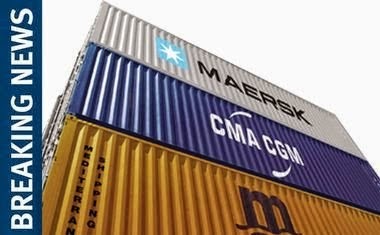Allseas interview: Richard Dale
1.7.14Richard Dale heads up Allseas’ fast-growing and dynamic sales team. He describes Allseas’ USPs and explains why, when it comes to logistics solutions, one size never ever fits all.
Q: Tell us about yourself and the team!
Richard: I joined Allseas three years ago from Ocean World Lines – when Allseas took over the UK agency for OWL. I took on the sales function for the whole of the company and was probably Allseas’ first dedicated sales person. We spent some time focusing on the best sales approach and format from there. In January we took the decision to create a new sales force and I now lead a sales team of five. From a standing start, we now have an excellent structure – a really enthusiastic, forward-thinking team that’s full of energy and eager to succeed!
Q: Who’s on the team?
Richard: Claudia Armitage covers the northern UK region and Claire Hallwood covers the Midlands. Mark Selby joined as our dedicated import sales person, and also covers the southern region. And in June this year, John Walker joined us as head of project development. He has more than 40 years’ experience in the general, contract and project freight forwarding industry – he’s worked for some of the largest logistics organisations and shipping lines in the world, as well as some of the more niche service providers.
Q: What’s your approach on training and motivation?
Richard: Our policy is to try to promote from within. And at Allseas, people don’t tend to move on – the company has a long-serving team. We run a structured and sustainable sales programme to enhance our people’s skills, including training in-house and by external specialists. We aim to provide people with the support they need to make them successful and that means support from their individual branch manager as well as from myself. A real Allseas priority is creating the right team for the right job – and matching individual abilities to the required roles. I learned many years ago that trying to get a square peg into a round hole doesn’t work. We pride ourselves in finding the right match. As for myself, one thing that has greatly helped in developing my role is having an MD (Darren Wright) who has an open mind and is receptive of new ideas. I bring in new ideas and some will work, some won’t – but the door is always open.
Q: Will we see further expansion of the sales team?
Richard: Yes, absolutely, we will increase the team as required. Notably, Allseas has created a supply chain division with a very experienced management team who have individual talents in operating and constructing supply chains in the past for major retail outfits. They are now in the process of bringing their unique skills to the logistics side – and who better to create supply chain solutions than people who have used them in the past? So we are building that from a position of strength and as it grows we will be bringing in more sales people under the Allseas banner, with their respective skills sets.
Q: You are talking to a potential customer – what are Allseas’ USPs?
Richard: Despite email, the internet and the whole electronic world, this is still very much a people business and we like to talk to people face to face. I am on the road as much as I can be. We will take customers’ individual requirements and mould a service around what they require – NOT what we think they require. I never ask my team to sell ‘off the shelf’ solutions – it is all about bespoke services. We investigate the customer’s needs and deliver a product that suits their particular needs. Obviously another outstanding USP for Allseas is the fact that we have our own equipment, which gives us an important advantage in the markets we serve.
Q: What’s the mood out there? Is the recession gloom behind us?
Richard: There is a feeling of more positivity. Last year it was the cautious approach but now there is a very positive ring in the air – things are moving in the right direction.
Q: How do you relax away from work? Do you manage to switch off?!
Richard: Yes, you have to switch off – but my phone is always on, 24/7, and it will always be answered! I have a young family, which keeps me busy and fit at weekends – we enjoy activities such as cycling and fishing.

















